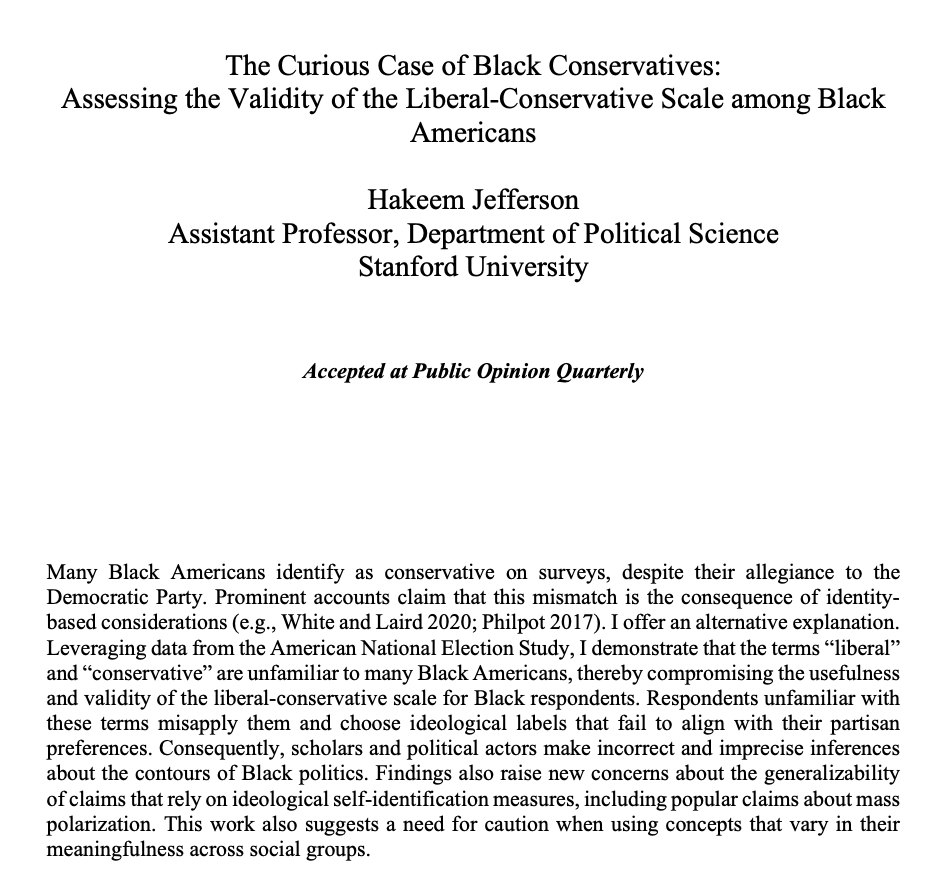The Curious Case of Black Conservatives: Assessing the Validity of the Liberal-Conservative Scale
My paper, "The Curious Case of Black Conservatives: Assessing the Validity of the Liberal-Conservative Scale among Black Americans" is now accepted at Public Opinion Quarterly. This paper looks at the disconnect between the overwhelming majority of Black Americans who identify with the Democratic Party and those who identify as conservative.

Hakeem Jefferson
Assistant prof @Stanford political science. I think about identity, stigma, race, and politics more than any normal person should. Lover of life. Pro-democracy.

-
My paper, "The Curious Case of Black Conservatives:
— Hakeem Jefferson (@hakeemjefferson) March 8, 2023
Assessing the Validity of the Liberal-Conservative Scale among Black Americans" is now accepted at Public Opinion Quarterly. I'm stoked.
Science is wild, y'all.
A 🧵 on the paper + some thoughts. https://t.co/vvfMftaWGO pic.twitter.com/KDNXTDjeyg -
Although the overwhelming majority of Black Americans identify with the Democratic Party, surveys suggest that up to one-half of Black respondents identify as conservative.
— Hakeem Jefferson (@hakeemjefferson) March 8, 2023 -
What accounts for this apparent disconnect, especially given general patterns of increased partisan and ideological sorting among the American public?
— Hakeem Jefferson (@hakeemjefferson) March 8, 2023
Look at plot of the correlation coefficiens between party id & ideology for white (black line) and Black Ams (red line). Wild! pic.twitter.com/tA9YfvUM2m -
Existing accounts posit that the group-centric nature of Black politics explains this so-called partisanship-ideology paradox. According to these accounts, Black Ams’ commitment to their racial group & the fear of social sanction from ingroup members explain this mismatch.
— Hakeem Jefferson (@hakeemjefferson) March 8, 2023 -
I offer an alternative explanation. Using data from @electionstudies, I demonstrate that the misalliance between Black Americans’ partisan & ideological identities manifests because the liberal-conservative scale lacks construct validity for a large share of Black respondents.
— Hakeem Jefferson (@hakeemjefferson) March 8, 2023 -
As scores on a measure of what I call “liberal-conservative familiarity” highlight, the terms “liberal” and “conservative” appear to resonate less with Black respondents relative to their white counterparts, thereby compromising the usefulness and validity of the measure.
— Hakeem Jefferson (@hakeemjefferson) March 8, 2023 -
When we account for variation in respondents’ familiarity with these ideological terms, we observe that Black respondents familiar with the terms select ideological labels consistent with their expressed partisan preferences, thus resolving the partisanship-ideology paradox. pic.twitter.com/euCI3AM3SN
— Hakeem Jefferson (@hakeemjefferson) March 8, 2023 -
The findings I present have significant consequences for the social sciences and survey research. The standard measure of ideology has been included on the @electionstudies since 1972. Today, it features prominently in scholarship across academic disciplines.
— Hakeem Jefferson (@hakeemjefferson) March 8, 2023 -
In political science, the liberal-conservative scale is one of the most frequently used measures in the study of American public opinion and forms the core of contemporary scholarship on polarization in the United States.
— Hakeem Jefferson (@hakeemjefferson) March 8, 2023 -
Even scholars not interested in ideology or polarization, per se, construct models of mass behavior that often include the measure. However, despite its popularity, the liberal-conservative scale cannot be used to understand the complexity and diversity of Black public opinion.
— Hakeem Jefferson (@hakeemjefferson) March 8, 2023 -
A couple of important notes! pic.twitter.com/VRovjZbnSo
— Hakeem Jefferson (@hakeemjefferson) March 8, 2023 -
To be clear, the insights presented here matter beyond the study of Black politics. They must be considered by anyone who relies on the liberal-conservative scale in their scholarship or in their commentary about American politics.
— Hakeem Jefferson (@hakeemjefferson) March 8, 2023 -
For example, to the extent that they intend to say something about polarization beyond the politics of white Americans, scholars must reassess the robustness of their claims in light of the evidence I present here.
— Hakeem Jefferson (@hakeemjefferson) March 8, 2023 -
Beyond polarization, the findings I highlight go a long way in helping us understand why other classic frameworks, including the Moral Foundations Theory, fail to replicate among Black samples.
— Hakeem Jefferson (@hakeemjefferson) March 8, 2023 -
So, what to do? When using the standard measure to proxy for ideology, researchers should consider describing to respondents what “liberal” and “conservative” mean.
— Hakeem Jefferson (@hakeemjefferson) March 8, 2023 -
Alternatively, researchers should consider using respondents’ policy positions to generate measures of ideology, which allows for an examination of Black politics unconstrained by the liberal-conservative framework.
— Hakeem Jefferson (@hakeemjefferson) March 8, 2023 -
To be sure, all of this is much harder than using the single-item liberal-conservative scale we are accustomed to using in our research.
— Hakeem Jefferson (@hakeemjefferson) March 8, 2023 -
Still, this reminder from Mondak (2001, 224–25) is worth remembering here, too: “It does us no good to draft a survey that is easy for interviewers to administer and for respondents to complete if ambiguity exists regarding the meaning of the resulting data.”
— Hakeem Jefferson (@hakeemjefferson) March 8, 2023 -
At best, the liberal-conservative scale produces ambiguous results for Black respondents. At worst, it produces wholly misleading results. Regardless, researchers interested in the politics of Black people should take Black people at their word.
— Hakeem Jefferson (@hakeemjefferson) March 8, 2023 -
When it comes to identifying as liberal or conservative, many simply “haven't thought much about it.” https://t.co/vvfMftaWGO
— Hakeem Jefferson (@hakeemjefferson) March 8, 2023 -
I won't dwell on it, but the crazy review processes this paper went through reminded me of how absolutely wed to existing constructs & measures we are as social scientists, even in the face of an avalanche of data. I mean, I wish I could share the revision memos & responses here.
— Hakeem Jefferson (@hakeemjefferson) March 8, 2023 -
Let me just say this: an uncritical, religious-like fidelity to any construct or measure is really bad for science. We can and should do and be better. For now, I'll leave it at that.
— Hakeem Jefferson (@hakeemjefferson) March 8, 2023
